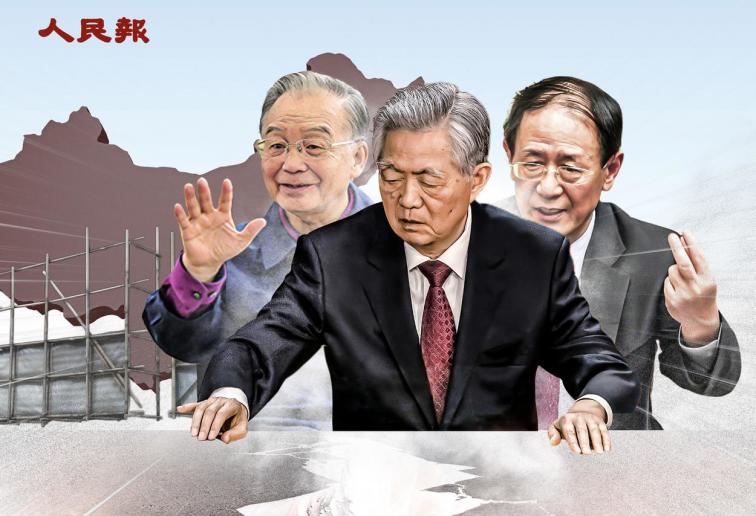Chinese Premier Li Qiang
[People News] On September 26, Chinese Premier Li Qiang gave a speech at the UN General Assembly in which he sharply targeted U.S. tariff policy and revealed Beijing’s ambition to compete for dominance over the international order. Yet just one day earlier, Li Qiang had presented a completely different face, borrowing former CCP Vice Premier Wang Yang’s 2013 rhetoric by using “husband and wife” as a metaphor for U.S.-China relations—only to be mocked as “Who wants to be married to a rogue?”
This was Li Qiang’s first attendance at the United Nations General Assembly since becoming premier in 2023, and also the first visit to the U.S. by a Chinese premier in almost a decade.
On September 26, in his UNGA speech in New York, Li Qiang, though not directly naming Trump, emphasised that Beijing is the defender of world order—a role until recently universally recognised as belonging to the United States. He criticised the “resurgence of unilateralism and Cold War mentality,” clearly hinting at the U.S. He singled out tariffs, claiming: “The current global economic downturn has a very important cause—tariffs.” He stated that China “has continuously been opening its doors wider to the outside world.” At a time when the United Nations is being weakened, Beijing “is willing to work with all countries to uphold the ideals of the UN.”
Li Qiang’s speech at the UN was aggressive toward the U.S., sought to pull the UN closer, divide the U.S. from other countries, and openly draw a line between China and the United States. Yet just one day earlier, on September 25, in some informal settings or closed-door meetings in the U.S., Li Qiang spoke very differently about U.S.-China relations.
According to the Wall Street Journal, at a discussion in New York with U.S. business leaders and scholars, Li Qiang adopted another tone. The report cited Stephen Orlins, president of the National Committee on U.S.-China Relations, who said: “Li Qiang said that couples may have disagreements, but they still remain closely connected.”
The metaphor of U.S.-China relations as husband and wife dates back to 2013, when then Vice Premier Wang Yang, considered a reformist, delivered an impromptu speech at the U.S.-China economic dialogue in Washington.
At that time, Wang Yang said with a somewhat joking tone: “The U.S.-China economic relationship is a bit like a married couple. We live on the same planet, you are in me, I am in you. Although we also quarrel and have differences, we must increase understanding, enhance mutual trust, and cultivate a shared foundation of life.” Wang Yang also recalled that his previous U.S. visit had been ten years earlier, joking that after ten years, “Americans are still taller than us, still stronger than us, and still have longer noses. Not much has changed.”
Li Qiang’s revival of the so-called “husband and wife relationship” between China and the U.S. triggered ridicule online. On overseas platform X, netizens commented: “Whoever is married to them is unlucky.” “It’s like Pan Jinlian and Wu Dalang—poisoning behind the scenes.” “Ridiculous—just held a military parade, the Axis of Three is already forged, and now they talk about stabilising U.S.-China relations?” “What a disgusting metaphor, who wants to be married to a thug?”
The Wall Street Journal noted that as U.S.-China relations have worsened in recent years, this “husband-and-wife” analogy has gradually faded out.
Radio France Internationale (RFI) analysed that the context of Wang Yang’s remarks was entirely different from that faced by Li Qiang.
In 2013, Xi Jinping had only been in power for a few months, and Deng Xiaoping’s foreign policy principle of “keeping a low profile” still dominated. U.S.-China relations were still in a period of comprehensive engagement and development. Later, Xi’s “wolf warrior diplomacy” came to dominate China’s international affairs, causing bilateral relations to steadily decline. Moreover, Beijing failed to fulfil its commitments made upon joining the WTO, prompting the U.S. to thoroughly reassess its engagement policy. Tensions in U.S.-China relations have only intensified.
RFI pointed out that Li Qiang’s parroting of Wang Yang’s words is outdated and no longer fits the times. It lacks the lighthearted and humorous tone of a decade ago. But it may also be sending some signals. Some analysts believe that, against the backdrop of China’s economic troubles, Li Qiang’s remarks show that Beijing does not wish to worsen relations with the U.S. and that strengthening communication with U.S. business and civil society remains Beijing’s traditional approach.
The Wall Street Journal also noted that Li Qiang’s comments at the discussion reflect Beijing’s desire to maintain stable relations with Washington at a time when a recent Trump-Xi phone call has helped ease tensions.
Orlins said Li Qiang “hopes the business community will serve as the ballast of bilateral relations.”
Many analysts believe that Li Qiang’s remarks are also paving the way for a meeting between Trump and Xi. △










News magazine bootstrap themes!
I like this themes, fast loading and look profesional
Thank you Carlos!
You're welcome!
Please support me with give positive rating!
Yes Sure!